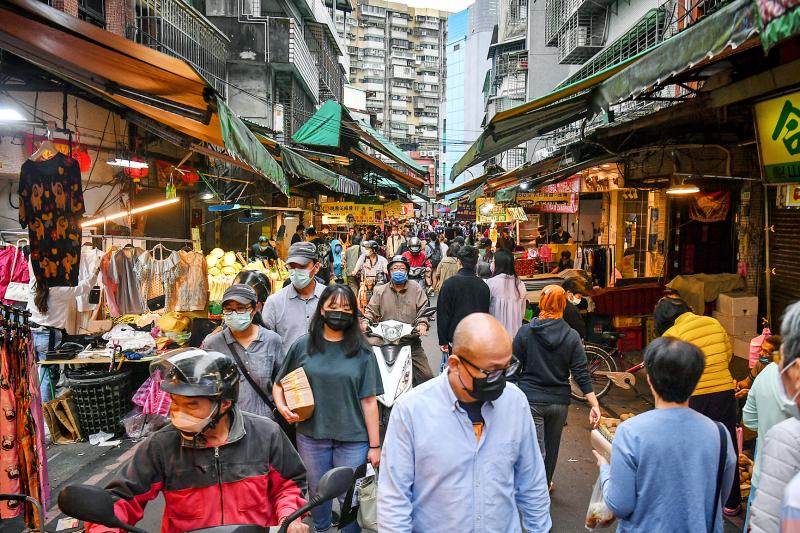Confidence in the nation’s economy has dropped to its lowest level in nearly two years, as major central banks’ monetary tightening, a local COVID-19 outbreak and China’s strict pandemic prevention measures affected sentiment toward economic conditions, wage growth, consumption of big-ticket items and property purchases, a survey published by Cathay Financial Holding Co (國泰金控) showed on Friday.
The online survey conducted from May 1 to May 7 also showed that Taiwanese have become more pessimistic about the local stock market since last month’s survey, given recent TAIEX volatility amid major central banks’ acceleration of monetary policy tightening.
About 50.1 percent of 21,129 respondents said they were pessimistic about the economy’s chances for improvement in the next six months, with 24.2 percent optimistic, the survey found.

Photo: CNA
Cathay Financial said the survey results pulled its economic optimism index for the next six months down to minus-25.9 this month, its lowest since May 2020, from minus-16.0 last month.
Taiwan’s economy expanded 3.06 percent from a year earlier in the first quarter of the year, the Directorate-General of Budget, Accounting and Statistics (DGBAS) reported on April 28, while expecting GDP to expand more than 4 percent this year.
However, the central bank earlier this month said that it might be difficult for GDP to grow 4 percent this year, citing adverse effects of the Ukraine war, and global monetary tightening on Taiwanese exports in the second half of the year.
The survey also showed that Taiwanese on average expect the economy to grow 3.09 percent this year, lower than the 3.3 percent estimate reported in last month’s survey, while about 81 percent of respondents said GDP would rise more than 2 percent this year.
Moreover, price increases on fruit, vegetables and daily necessities, along with higher costs for fuel and commodities, have raised concerns about inflation, the survey showed, as nearly 89 percent of respondents expect the consumer price index (CPI) to exceed 2 percent this year, with about 45 percent expecting the index to stand at between 2.5 percent and 3 percent.
Cathay Financial said that Taiwanese expect the CPI to increase by an average of 2.66 percent this year, higher than the 2.36 percent estimated in last month’s survey.
The CPI increased 3.38 percent last month, the second consecutive month that the inflation gauge surpassed 3 percent, and the ninth consecutive month it exceeded the central bank’s 2 percent threshold, the DGBAS said.

MULTIFACETED: A task force has analyzed possible scenarios and created responses to assist domestic industries in dealing with US tariffs, the economics minister said The Executive Yuan is tomorrow to announce countermeasures to US President Donald Trump’s planned reciprocal tariffs, although the details of the plan would not be made public until Monday next week, Minister of Economic Affairs J.W. Kuo (郭智輝) said yesterday. The Cabinet established an economic and trade task force in November last year to deal with US trade and tariff related issues, Kuo told reporters outside the legislature in Taipei. The task force has been analyzing and evaluating all kinds of scenarios to identify suitable responses and determine how best to assist domestic industries in managing the effects of Trump’s tariffs, he

TIGHT-LIPPED: UMC said it had no merger plans at the moment, after Nikkei Asia reported that the firm and GlobalFoundries were considering restarting merger talks United Microelectronics Corp (UMC, 聯電), the world’s No. 4 contract chipmaker, yesterday launched a new US$5 billion 12-inch chip factory in Singapore as part of its latest effort to diversify its manufacturing footprint amid growing geopolitical risks. The new factory, adjacent to UMC’s existing Singapore fab in the Pasir Res Wafer Fab Park, is scheduled to enter volume production next year, utilizing mature 22-nanometer and 28-nanometer process technologies, UMC said in a statement. The company plans to invest US$5 billion during the first phase of the new fab, which would have an installed capacity of 30,000 12-inch wafers per month, it said. The

Taiwan’s official purchasing managers’ index (PMI) last month rose 0.2 percentage points to 54.2, in a second consecutive month of expansion, thanks to front-loading demand intended to avoid potential US tariff hikes, the Chung-Hua Institution for Economic Research (CIER, 中華經濟研究院) said yesterday. While short-term demand appeared robust, uncertainties rose due to US President Donald Trump’s unpredictable trade policy, CIER president Lien Hsien-ming (連賢明) told a news conference in Taipei. Taiwan’s economy this year would be characterized by high-level fluctuations and the volatility would be wilder than most expect, Lien said Demand for electronics, particularly semiconductors, continues to benefit from US technology giants’ effort

‘SWASTICAR’: Tesla CEO Elon Musk’s close association with Donald Trump has prompted opponents to brand him a ‘Nazi’ and resulted in a dramatic drop in sales Demonstrators descended on Tesla Inc dealerships across the US, and in Europe and Canada on Saturday to protest company chief Elon Musk, who has amassed extraordinary power as a top adviser to US President Donald Trump. Waving signs with messages such as “Musk is stealing our money” and “Reclaim our country,” the protests largely took place peacefully following fiery episodes of vandalism on Tesla vehicles, dealerships and other facilities in recent weeks that US officials have denounced as terrorism. Hundreds rallied on Saturday outside the Tesla dealership in Manhattan. Some blasted Musk, the world’s richest man, while others demanded the shuttering of his